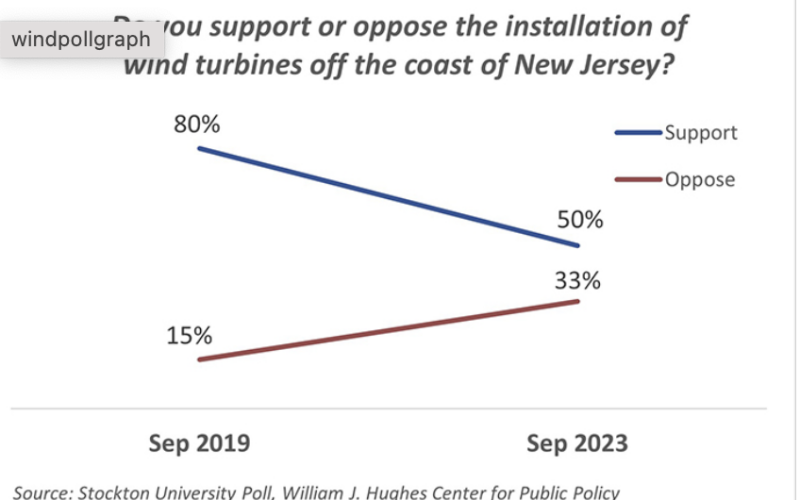A new Stockton University Poll shows New Jersey public support for building offshore wind turbines took a steep dive over the past four years, especially among residents in areas along the ocean and bays – where the plans for wind power once enjoyed 77 percent support.
Today that support has plunged to 33 percent among the latest poll respondents in coastal areas, the Stockton pollsters reported this week.
The findings follow months of intense news coverage about whale strandings on Jersey Shore beaches, and furious campaigning from offshore wind project opponents who say construction will damage the fishing industry. Another big worry is how visual impact of turbines seen from the beach could hurt property values and the summer tourism economy.
Overall support among New Jersey residents still favors offshore wind energy development, with 50 percent in favor of the state’s plans to for building turbines arrays and 33 percent opposed, leaving 16 percent were unsure.
Yet statewide, “the results reflect a drop of 30 percentage points from the findings of a September 2019 Stockton Poll that asked an identical question,” noted pollsters with the William J. Hughes Center for Public Policy at Stockton. “In 2019, 80 percent of adult New Jersey residents supported offshore wind farms.”
“When the concept of wind farms moved from abstract policy considerations to preparing for actual construction, many residents said, ‘Not in my backyard, or at least not off my beach,’” said John Froonjian, director of the Hughes Center, in a summary of the poll results.
“That’s especially true along the coast, where wind farms have been the focus of protests and legislative election campaigns,” he said.
In the poll of almost 600 adults, when asked to rate the impact of offshore wind projects, 71 percent said turbines would affect ocean views. Of those 34 percent foresee a major visual impact, 37 percent a minor effect, and 16 percent no effect.
Respondents thought shore tourism would be affected at least somewhat: a great deal by 27 percent and a little by 28 percent, while 37 percent saw no impact on tourism. After months of public debate over the potential for effects on marine mammals and fisheries, 44 percent said wind turbines would affect marine life a great deal, and 24 percent anticipate minor effects.
Among the poll almost 600 adults, 72 percent expressed concern about climate change, with 51 percent saying it is very important for the state to combat it and 21 percent calling it “somewhat important.”
“Only 1 in 4 said it was not very important (9 percent) or not important at all (17 percent) for the state to make those efforts,” according to the Hughes center.
A majority of 52 percent said renewable energy sources such as wind will improve the climate, with 9 percent saying it would worsen conditions and 28 percent saying it would have no effect.
Significant pluralities of respondents agreed wind projects could lead to local job opportunities, lower energy costs and better reliability.
“However, 48 percent opposed giving tax breaks to companies building the wind turbines, with 39 percent in support and 12 percent unsure,” according to the poll report. In a last-minute state budget vote June 30, Democratic state legislators approved giving wind developer Ørsted a bigger share of federal energy tax credits to keep its Ocean Wind 1 project viable amid sharply rising costs.
“On every question, residents of Shore communities were more negative about wind energy than people living elsewhere in New Jersey,” said Alyssa Maurice, a Hughes Center research associate.
Maurice said an even stronger divide was found along partisan lines, with Democrats strongly supporting wind energy and seeing potential benefits and Republicans roundly opposing turbines as negative forces.
The Stockton poll findings mirror a May 2023 report from the Farleigh Dickinson University poll that likewise showed a fall-off in wind power support among New Jersey residents. That poll found a similar partisan split in opinions, but also showed that concern over marine mammal deaths cut across party lines.
Along with the poll results, the Hughes center released an audio interview by Maurice with Patrick Hossay, a longtime Stockton environmental studies professor and an expert in alternative energy sources. In the 31-minute podcast, Hossay explains how wind turbines work, their potential impact on marine life and the economy and their safety record internationally. The center also issued its full poll results online here.







